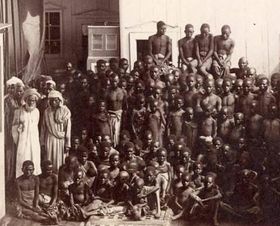Template:Pictorial-Islam-options: Difference between revisions
| [checked revision] | [checked revision] |
mNo edit summary |
mNo edit summary |
||
| Line 236: | Line 236: | ||
<option weight="1">{{Pictorial-Islam|1=Diseases and Cures in the Wings of Houseflies|2=[[File:Phage.jpg|200px|link=Diseases and Cures in the Wings of Houseflies]]|3=The thesis put forward by some Muslims is that it has recently been proven by modern science that flies carry not only pathogens but also the agents that limit these pathogens, thus proving the fly wing hadiths that tell us "If a fly falls into one of your containers [of food or drink], immerse it completely before removing it, for under one of its wings there is venom and under another there is its antidote." They principally identify these agents to be bacteriophages, though they also sometimes refer to fungi. The scientific evidence does not support the veracity of the fly wing hadiths for many reasons, including: (1) Bacteriophages are not limited to any specific wing of the fly. (2) Bacteriophages in the natural state and concentration are not antidotal to bacterial diseases, particularly for temperate or lysogenic phages. (3) Bacteriophages are ineffective against non-bacterial diseases carried by flies, meaning even if the wings were to provide you with an antidote to bacterial diseases, they could infect you with another non-bacterial disease (i.e. dipping a fly into your drink is not good advice). ([[Diseases and Cures in the Wings of Houseflies|''read more'']])}}</option> | <option weight="1">{{Pictorial-Islam|1=Diseases and Cures in the Wings of Houseflies|2=[[File:Phage.jpg|200px|link=Diseases and Cures in the Wings of Houseflies]]|3=The thesis put forward by some Muslims is that it has recently been proven by modern science that flies carry not only pathogens but also the agents that limit these pathogens, thus proving the fly wing hadiths that tell us "If a fly falls into one of your containers [of food or drink], immerse it completely before removing it, for under one of its wings there is venom and under another there is its antidote." They principally identify these agents to be bacteriophages, though they also sometimes refer to fungi. The scientific evidence does not support the veracity of the fly wing hadiths for many reasons, including: (1) Bacteriophages are not limited to any specific wing of the fly. (2) Bacteriophages in the natural state and concentration are not antidotal to bacterial diseases, particularly for temperate or lysogenic phages. (3) Bacteriophages are ineffective against non-bacterial diseases carried by flies, meaning even if the wings were to provide you with an antidote to bacterial diseases, they could infect you with another non-bacterial disease (i.e. dipping a fly into your drink is not good advice). ([[Diseases and Cures in the Wings of Houseflies|''read more'']])}}</option> | ||
<option weight="1">{{Pictorial-Islam|1=Allah the "Best of Deceivers"|2=[[File:Quran 3-54.png|290px|link=Allah the Best Deceiver]]|3=The Qur'an openly states many times that Allah is the 'best deceiver'. The root word used in these verses is Makr which means deception. The literal translations, referenced from a Muslim website, make this very clear. Although there are many places in the Qur'an that use the same word (makir) in reference to Allah, this article will focus only on the verses in which Allah describes himself as the 'best deceiver'.([[Allah the Best Deceiver|''read more'']])}}</option> | |||
</choose><!-- HELP NOTES: <option>{{Pictorial-Islam|1=TITLE OF STORY|2=IMAGE LINK (SEE ABOVE FOR EXAMPLE)|3=TEXT OF STORY - SHOULD INCLUDE READ MORE LINK}}</option> --><noinclude>[[Category:Templates]][[Category:Random Templates]]</noinclude> | </choose><!-- HELP NOTES: <option>{{Pictorial-Islam|1=TITLE OF STORY|2=IMAGE LINK (SEE ABOVE FOR EXAMPLE)|3=TEXT OF STORY - SHOULD INCLUDE READ MORE LINK}}</option> --><noinclude>[[Category:Templates]][[Category:Random Templates]]</noinclude> | ||
Revision as of 21:54, 13 September 2013
Also see: Template:Pictorial-Islam
|
